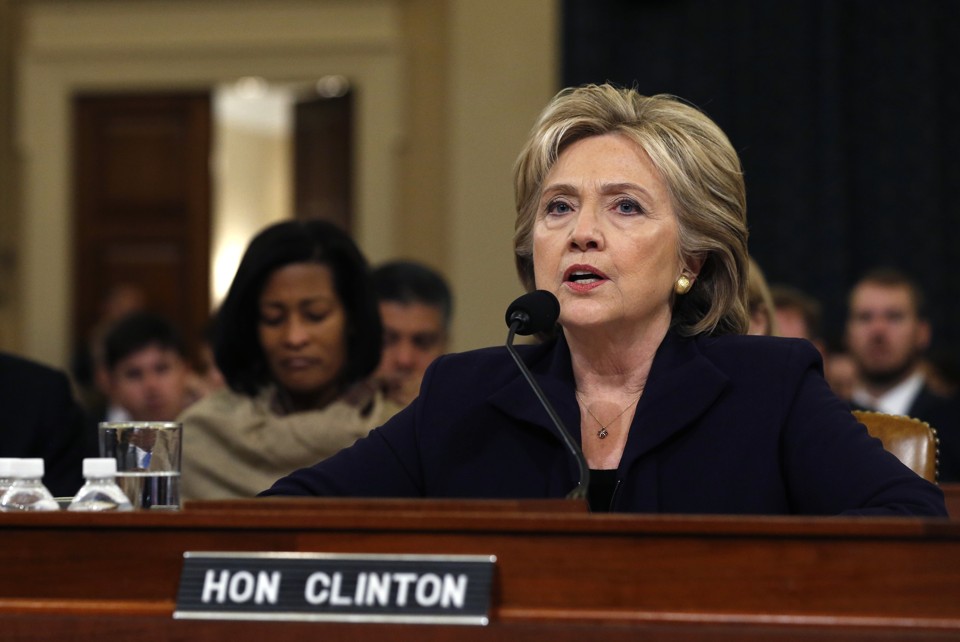Updated on October 22 at 1:51 p.m. ET
It’s a good bet that Thursday will be the climax for the House select committee on Benghazi. After almost 18 months and dozens of hearings, the committee interviews Hillary Clinton on Thursday, in a marathon public hearing expected to last eight to 10 hours.
Whether you regard the hearings as an essential inquiry or a political farce, Clinton’s testimony was always going to be the main event. Several separate investigations have already considered the September 11, 2012, attacks in Libya, which killed four Americans, including Ambassador Chris Stevens. Most of the big questions have largely been answered. Yes, the State Department that Clinton led should have done more to protect personnel in Libya; but, no, there’s no evidence thus far of any criminal negligence.
Thursday’s hearing has taken on a new political charge in the past few weeks, however. While Democrats have long derided the hearing as pure politics intended to hurt Clinton, they have recently gotten assistance in making their case from an unexpected quarter: Republicans, from Majority Leader Kevin McCarthy to a fired staffer, who have suggested the committee’s purpose was essentially political, to harm the Democratic presidential frontrunner. Committee chair Trey Gowdy has come under intense scrutiny and referred to the recent pressure as “among the worst weeks of my life.” (Clinton can surely sympathize.)
That means Thursday’s hearings have high stakes for all involved. Clinton is coming off a good stretch on the presidential trail: She was named winner of the first Democratic debate, her poll numbers are bouncing up, and Vice President Joe Biden declined Wednesday to challenge her for the nomination. She will have to avoid missteps during Thursday’s hearing to maintain her momentum. An error could reawaken jitters about her legitimacy. Clinton’s appearance before the Senate Foreign Relations Committee about the attacks in 2013 was generally positively reviewed, but also produced one ill-advised line about the genesis of the attacks—“What difference does it make?”—that has been used effectively against her.
Republicans also have a great deal on the line: There’s pressure for them to prove that the committee’s purpose is legitimate. The problem is that while the committee has proved extremely leaky, the only really damaging stuff has been the political damage done to Clinton by revelations about her use of a private email account while secretary of state. If Republicans can’t deliver the goods on Thursday, the pressure on the committee to wrap up its work will grow. Democratic members of the committee are reportedly considering resigning en masse after Thursday’s hearing to deprive the panel of its bipartisan bona fides.
As much as is on the line, an eight-hour House hearing is still an eight-hour House hearing, and much of it is likely to be dull. We’ll be tracking the interesting moments and covering them in this space throughout the hearing.
* * *
10:56 a.m. Opening statements have just wrapped up on Capitol Hill. Gowdy’s statement was a typically polished speech, but it suggested a certain amount of defensiveness—the South Carolina representative worked to defend the legitimacy of his committee.
“Madame Secretary, I understand some people—frankly in both parties—have suggested this investigation is about you. Let me assure you it is not,” he said. “Our committee has interviewed half a hundred witnesses, not a single one of them has been named Clinton until today. You were the Secretary of State for this country when our facility was attacked. So, of course this Committee is going to talk to you. You are an important witness, but you are just one important witness, among half a hundred important witnesses.”
Elijah Cummings, the Democratic ranking member, offered a mirror image of Gowdy’s statement, blasting the committee as pure politics. “Republicans are squandering millions of taxpayer dollars on this abusive effort to derail Secretary Clinton’s campaign,” he said. “It is time, and it is time now, for Republicans to end this taxpayer-funded fishing expeditions.”
Clinton focused more on the attacks themselves than either Gowdy or Cummings. While she took some sidelong shots at the committee, noting the several previous investigations, she largely focused on what happened in Benghazi. She spoke at length about Stevens, noting she’d appointed him as ambassador and taking responsibility for his death. Clinton said the lesson was that the U.S. must protect personnel while also recognizing that “America must lead in a dangerous world, and our diplomats must continue representing us in dangerous places.”
Gowdy’s statement is here. Cummings’s is here. Clinton’s is here. The Washington Post has a running transcript here.
1:50 p.m. So far the greatest fireworks from the hearing didn’t involve Hillary Clinton at all—they came from a contretemps between Gowdy and Cummings, who ended up in a shouting match over Sidney Blumenthal, the longtime Clinton confidant. (More on whom here and here.) Blumenthal sent Clinton dozens of emails about Libya, which she says were unsolicited. Republicans have argued (dubitably) that he was her primary source of intelligence on the country. After Democrats attacked the focus on Blumenthal, Gowdy cut in and defended it. Cummings accused him of misleading, and demanded that the transcript of Blumenthal’s prior testimony to the committee be entered into the record. Representative Adam Schiff, another Democrat, also jumped in on the action.
And then ... well, see for yourself:
Clinton for her part sat and watched the fight unfold with a mixture of what appeared to be amusement, annoyance, and boredom.
Then the hearing adjourned for lunch.
What else have we learned so far today? Not a great deal. Curiously, Clinton says she did not have a computer in her office at the State Department. Her facility with a BlackBerry has been much remarked-upon, but she said that notwithstanding the focus on her emails, it was not her main method of gathering information at the department.
It doesn’t appear that Republicans have scored any direct hits on her, nor that she’s committed any serious stumbles. Representative Mike Pompeo seemed to land a hit when he asked why so many of Blumenthal’s emails had gotten to her while none of Stevens’ security requests had.
Overall, however, the hearing has focused on the committee’s own legitimacy and on Sidney Blumenthal—likely not the debate Republicans wanted, but one Clinton is content to have.








3m ago23:56
Susan Brooks asks if Clinton is aware that congress passed an act after the Nairobi embassy bombing specifying that only the secretary of state could sign waivers on security. “Was a waiver signed in Benghazi after the temporary mission compound was authorized?”
“I think that the CIA annexe I had no responsibility for,” Clinton says. Says she cannot speak for that. “The compound in Benghazi was neither an embassy nor a consulate. Those are the only two facilities for which we would obtain a formal diplomatic notification; and those are the only facilities that we would have sought a waiver for.”
http://www.theguardian.com/us-news/live/2015/oct/22/hillary-clinton-benghazi-emails-committee-updates
StayingCivil
23m ago
34
This is just such a monumental waste of money and time….God forbid we actually have a Congress that, you know, actually governs.
The Republicans are actually managing to make Hilary a sympathetic person with their ridiculous hearings.
Reply
Report
HumanistLove
27m ago
34
The GOP is pathetic.
Over 7 hearings and over 4 million in tax payer dollars have been spent on this drawn-out inquisition producing nothing new in evidence.
The GOP already knows the truth about Benghazi and the facts have been regurgitated many times.
It is obvious this is just a way to hurt HRC in the polls and the GOP is already on record for stating this by Kevin McCarthy (CA-R)....the man who was once considered for the SOH position.
http://www.theguardian.com/us-news/live/2015/oct/22/hillary-clinton-benghazi-emails-committee-updates